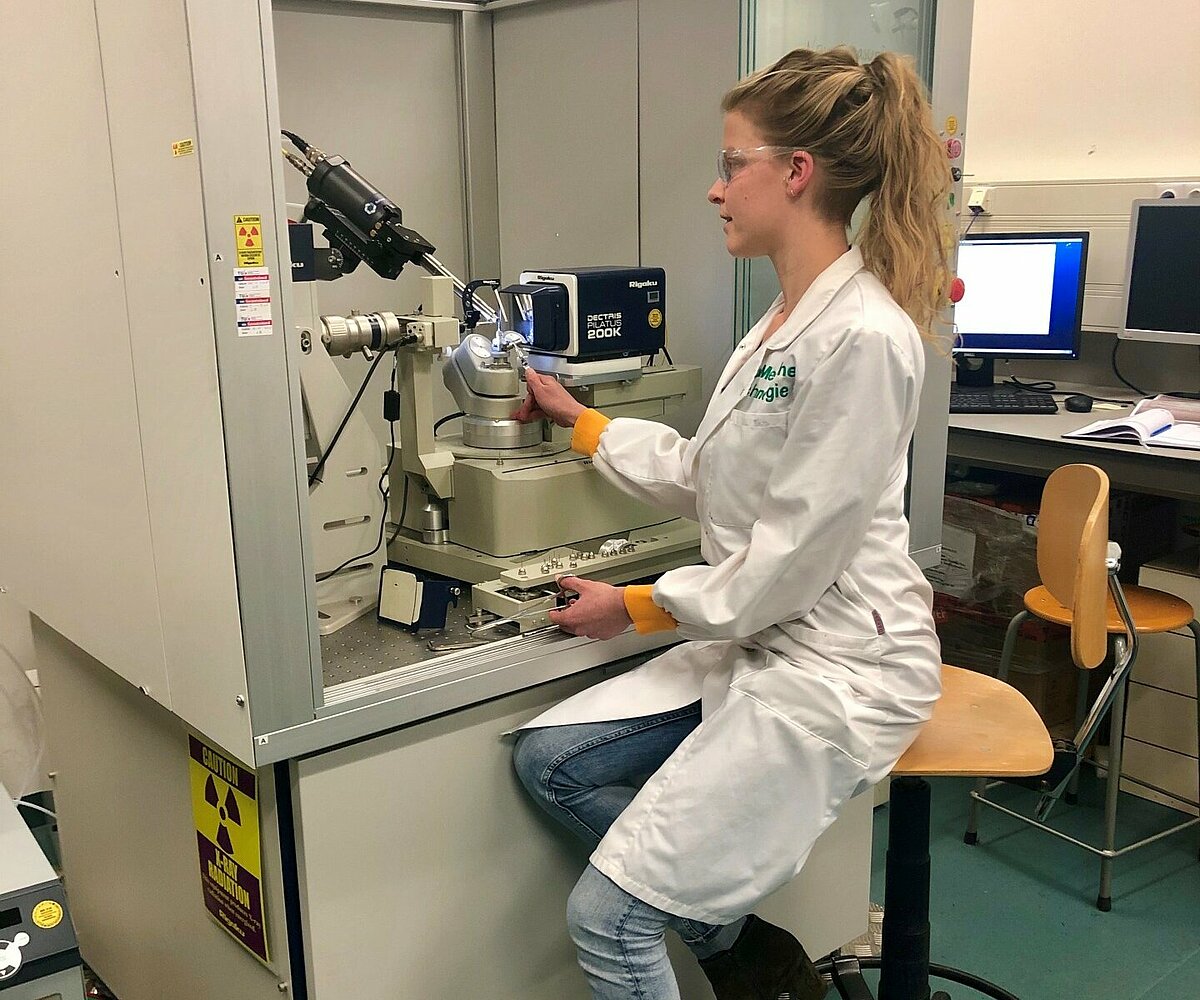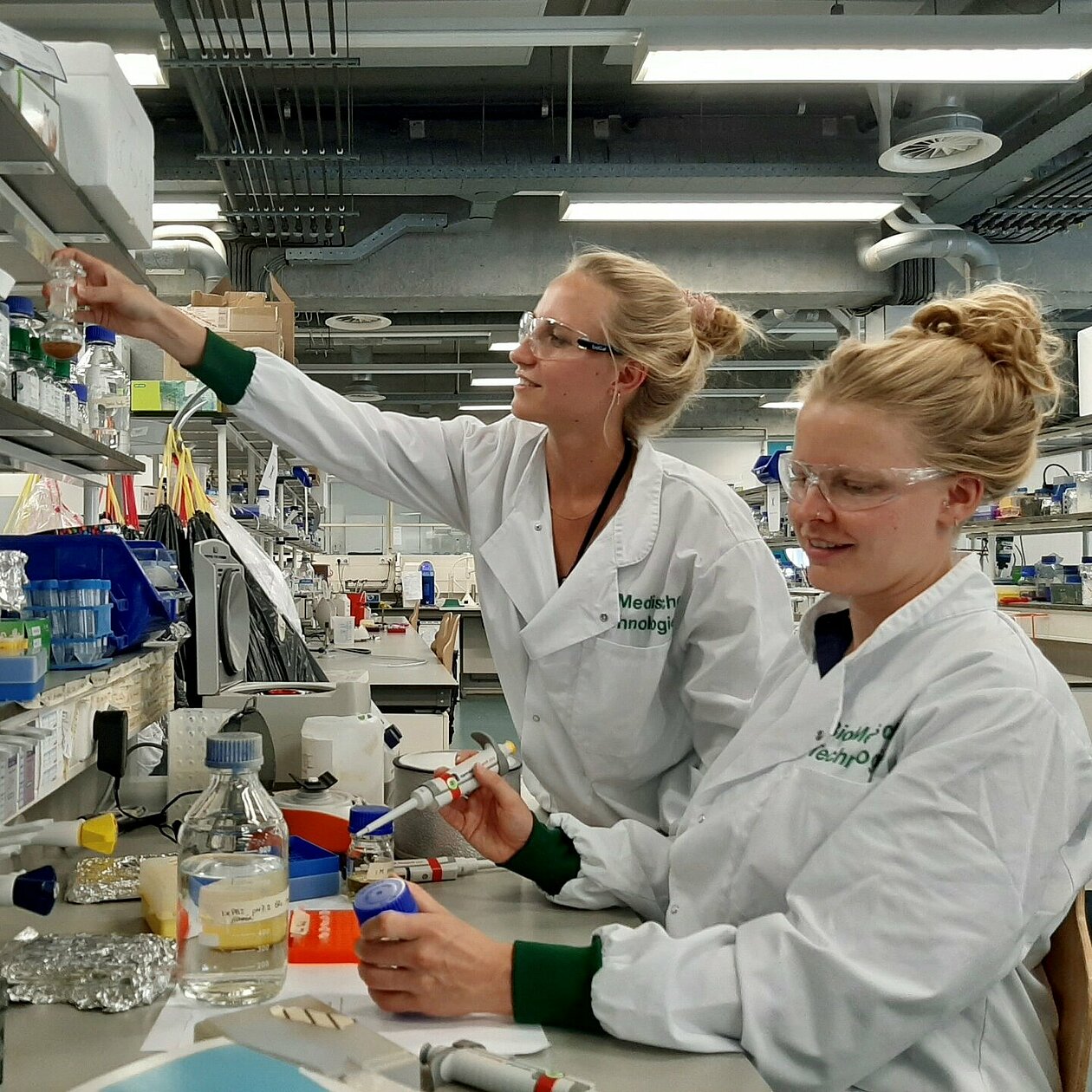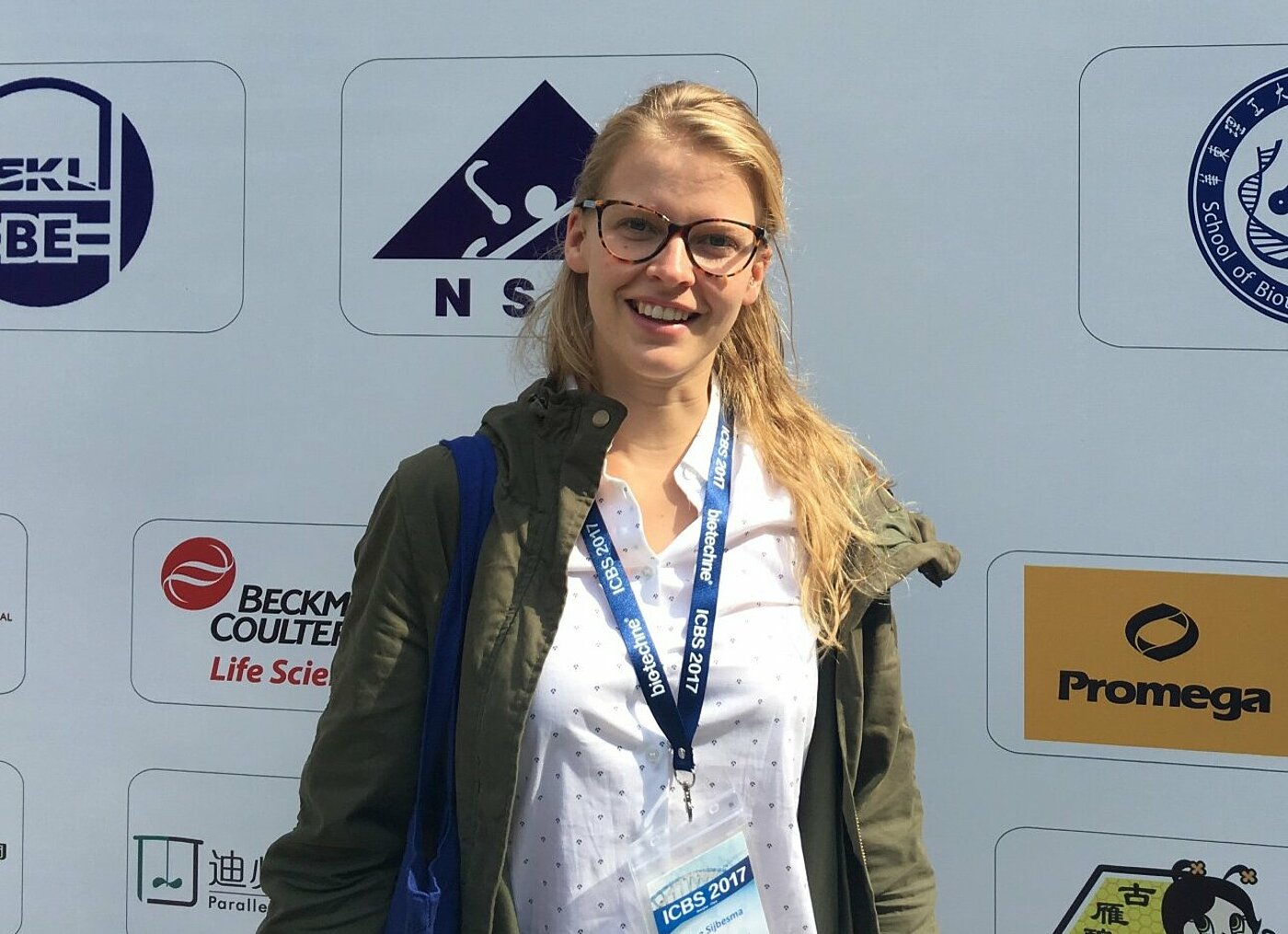08 April 2024
Netherlands lags behind in artificial intelligence
- AI (artificial intelligence)
- About Brainport

In Brainport Eindhoven we change the world because here we develop key technologies that change society. We can only do this thanks to our pioneers. That’s why we would like you to meet one of our pioneers: Eline Sijbesma.

My name is Eline Sijbesma. I’m 30 years old and I’m originally from Nijmegen.
Since the summer of 2020, I have been working as a scientist for Ambagon Therapeutics. This startup is the result of the academic research of the Chemical Biology Group of the TU/e. We conduct drug research at a very early stage in the entire drug development process. We have developed a new method and have done a lot of research into it, to be able to intervene in diseases in a new way. For this we develop small molecules that glue two components together in the cell. These are two proteins, one of which is involved in the disease pattern. By attaching it to another protein, we can inhibit that disease protein. We first extensively investigated whether molecules could be found for this approach at all, for which diseases we could use it and how broad that application is. We are now building on this in the company.

I worked on this during my PhD research, as did several other colleagues in the same research group. My project was in collaboration with a group at the University of California San Francisco (UCSF). It soon became apparent that it is actually very promising. The idea to start a company had been around for some time, but now with this data in their pocket, the professors have started talking with investors. We also participated in some venture challenges and won several prizes. Finally, Ambagon was founded in July 2020. Since then the team has grown; we are now in Eindhoven with a team of 8 and 10 real 'Ambagonians' working in San Francisco. Indeed, it seems that the first steps succeed in any case. We want to bring academic research closer to the market with the ultimate goal of being able to apply medicine for people who are sick.
Initially, we focus on oncology. There is a great opportunity for us to apply this technique because in several specific cases there are no alternative therapies available. Our growth plan also includes some other diseases. Think, for example, of neurological disorders or autoimmune diseases, but that is still in the future.
"We have the opportunity to make a difference for people with a disease that is currently very serious and often not curable. Maybe we'll find something that could be a breakthrough. It's a slim chance, but it does exist."
Eline Sijbesma
We focus on one specific protein: 14-3-3. Many processes in the cell are regulated by different proteins that bind to each other and in this way pass on information. 14-3-3 has an important role in this and is actually a kind of overseer that binds to many different important proteins and thus regulates their functions. With the molecules we develop, we can now kind of turn the volume knob to make the bond stronger in specific cases and to increase the regulatory effect of 14-3-3.
At the end of my master's degree in 2015, I worked in the lab there for six months. That was because my professor, Christian Ottmann, and a professor from UCSF, Michelle Arkin, had already met at conferences and had many ideas for a joint research project. Christian is kind of a 14-3-3 guru. He has worked on this special protein throughout his academic career. Michelle leads a research group in Pharmaceutical Chemistry at UCSF and is co-director of the Small Molecule Discovery Center there. Enough ideas, but they still needed someone to set up and implement a project. That's how I ended up with Michelle in the lab. In Eindhoven, they asked me to come back for a PhD, in which I would continue to work based on the results I had found there. During my four-year PhD trajectory, the collaboration remained very active and I worked a few more times for a few months in San Francisco. Together with Luc Brunsveld, professor in the chemical biology group, Christian and Michelle are the founders of Ambagon Therapeutics.
For now, it’s certainly my dream to contribute to the success story of Ambagon. I'd like to stay there to see how far we can go and how successful we will be in achieving our ambitious goals. I don't have a clear picture of how after that, the uncertainty of a startup is too great for that. We may not exist in two years, but there is also a chance that we will go sky high! I want to be there to experience that. A biotech startup is also super fun and educational environment. So many interesting things happen that you don't see at any other company.
Thinking out the process of how we want to grow and in which direction. Which experiments are essential, how do you get the message across to investors and how do you set ambitious but also realistic goals for the company. But also how you think about building up a workforce and what it takes to set up new lab spaces. Because if you are going to grow, you will need more facilities. We also do everything ourselves, from laying a floor in an office to managing contract research organizations (CROs). You learn a lot from that.
In an academic career, secretly, quite a lot remains on the shelf. In a startup, you can take that step towards a 'real life' application and that is very motivating for me. It may be another 5 or 10 years, but we have the opportunity to make a difference for people with a disease that is currently very serious and often not curable. Maybe we'll find something that could be a breakthrough. It's a slim chance, but it does exist. That is the motivation to continue. And if it doesn't work, it's still not wasted time, we're building the knowledge needed to bring new drugs to the market. I have to remind myself of that from time to time, especially because it can take so long and the chance is so small - that even if it doesn't work out, this work is very valuable. I sometimes find that difficult, but we have a super strong team and we do it together. Another very nice thing!

I have completed a bachelor's and master's degree in Biomedical Engineering at TU/e. I graduated from the Department of Chemical Biology.
In high school, I found all technical subjects interesting (which ended up as the only girl in a class with only boys, hopefully, that will be different in high schools now!). I wanted to go to a technical university, but I didn't have a clear idea. At an information day of Biomedical Technology, they showed an overview picture of 'what we do here is to apply all kinds of facets from technical studies to the human body'. Then I thought, "Wow, yeah cool, this is it, I'm going to do this!" And then I signed up and just started a few months later. Only later during the master did I roll in this direction. In the beginning, researching in a lab didn't seem like anything to me, but in the end, I've been in the lab for 7 or 8 years now, haha!
"In the beginning, researching in a lab didn't seem like anything to me, but in the end, I've been in the lab for 7 or 8 years now."
Eline Sijbesma
It appealed to me here; the campus and the city. I did look at Delft, but I thought that was too far away. I had a good feeling about Eindhoven. The Brabant region has not disappointed me, I still enjoy sitting here.
No, I was a member of a student association. I thought my study was enough to occupy my brain and therefore didn't look much next to my study to broaden myself or delve into study-related things, but I found the other aspects of student life very interesting. Just nice freedom, happiness, getting to know new people and having fun parties. And then there weren't nearly as many cool student teams as there are now.
A lot is going on here. I can remember well that I went to study and that Eindhoven was inventing and developing itself. A lot of attention was paid to making it the technical hub of Europe. Around that time, Eindhoven began to profile itself more and more in this way. Strijp-S was also really on the rise. During my studies, we also regularly visited the High Tech Campus for company visits and even for lectures or an oral exam. You could tell that a lot of interesting things happened. What strikes me most is that the number of student teams has exploded in the past 10 years. Everything became possible and students can be fully enterprising, which is super important! It was a nice time to study here. You could tell it was starting to bubble at TU/e. It was also nice to live in rooms in Eindhoven.
"Look around you with an open mind so you can see opportunities and seize them. This way you will automatically find something that makes your heart beat faster."
Eline Sijbesma
Something that has always driven me is to just be open to opportunities that come along and not want to plan and fill everything in advance. Everything that comes your way, of which you get an enthusiastic feeling, seize the opportunity, don't think too much, just do it. Try it it's for you. Look around you with an open mind so you can see opportunities and seize them. This way you will automatically find something that makes your heart beat faster. There is an increasing emphasis on rationalizing and planning everything, but I don't think that's a very good development. Don't worry too much if things don't work out. Sometimes you also need time to wander around a bit. Try not to worry too much about the future and a student loan, for example. Your study time is so valuable to be able to discover, develop and develop. You can do serious things all your life, so don't be held back and too careful. Above all, don't be afraid to make mistakes.
"I also had a very difficult time during my PhD. I had to face myself, through high expectations of myself and of the research."
Eline Sijbesma
My story sounds pretty rosy from the outside, but I also had a very difficult time during my PhD. I had to face myself, through high expectations of myself and of the research. I thought I would make it all the way through, and every day that I didn't yet felt like a failure. After a few very successful months in the first year, it seemed like nothing worked anymore. I came back from San Francisco and I didn't know what to do anymore. I wondered if I could do it if I was good enough. That was a really difficult time and I thought for a long time that I had to deal with it myself, to the point where I wanted to stop. I dreaded going to university every day. I then had conversations with one of the TU/e psychologists and after a while, I rediscovered the joy of working. I think it is very recognizable that many people have high expectations of themselves and especially during a PhD you are confronted with yourself. That you know what the goal is but do not know how to achieve it, a high workload, perform every day and keep going, keep going. While having fun at work is super important. In the end, I was promoted cum laude, which I didn't see coming at all. That experience and motivation have made me realize that you may not be able to do everything and you may not be great or the very best, but you are good enough. That has been a hard lesson. So I'd like to say that any story that sounds great probably has another side to it. I also think it is important that we are all very open about that.